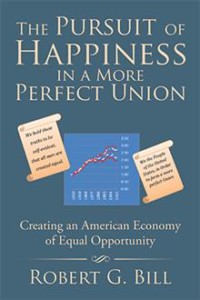Title: The Pursuit of Happiness in a More Perfect Union
Author: Robert G. Bill
Publisher: Xlibris
ISBN: 978-1-5245-5045-5
Pages: 294
Genre: Political Economy
Review: Barbara Bamberger Scott
Buy on Amazon
Pacific Book Review Star
Awarded to Books of Excellent Merit

Author Robert G. Bill, with a Ph.D in Mechanical Engineering turns his attention to the inner workings of American economic policy and its relation to our cherished principles of liberty for all in his book The Pursuit of Happiness in a More Perfect Union. Robert G. Bill, formerly a researcher in fire protection for major insurer FM Global, believes that there may be a logical path to economic equity in the United States. In this well considered work he proposes a methodology that might satisfy both conservative beliefs (pursuit of individual happiness as suggested in the Declaration of Independence) and liberal ideals (regard for the general welfare as stated in the Constitution).
In order to develop his multiple themes, he looks back at key turning points in our financial history and significant alterations to fiscal policy that have brought us to where we are today. He explains the ideal financial model in a democracy has always been an open marketplace in which there are so many sellers so buyers have real choices and therefore determine the quality and quantity of goods sold. However, the reality has more often been either a monopoly scenario such as just before the Great Depression, or more commonly, an oligopoly in which there are only a handful of sellers for widely needed commodities such as, in the US today, as an example of electricity and oil. The evidence offered in Bill’s book leads to the inescapable conclusion that though we are “the richest and most influential country in the world,” we lack a truly free market, and this means that the poor are still with us and do not participate in the pursuit of happiness.
Using numerous graphs, historical examples, quotations and charts to support his thesis, Bill suggests in order to promote income equality in which all are free to pursue the American dream, taxation must be restructured (within reasonable and bearable parameters) to achieve goals such as a $15 per hour minimum wage, educational subsidies for up to four years of trade school and some form of universal healthcare. But he sagely notes that even though the people may be in favor of working toward these goals, their representatives in all branches of government may not. Plus, many factors which stand in the way of a free-flowing economy are not purely economic: executive decisions, legislative reactions to short term crises, judicial decisions on key policies—all may assist or impede economic equality.
Bill’s book, with quotations from such diverse sources as Thomas Jefferson, Adam Smith and Ayn Rand, is a dense compendium. It is aimed at the serious reader prepared to study the subject in depth and alter thought patterns according to the facts presented. It is rare to find such a well-organized text presenting innovative and logically supportable ideas, and even more so when the author freely avows his lack of the academic background in finance and government usually associated with the material offered. Bill is clearly poised to gain recognition in this field.
Intelligent, fact-rich, and thoroughly researched, The Pursuit of Happiness in a More Perfect Union is on a trajectory to garner attention for the author’s economic and political theories.


